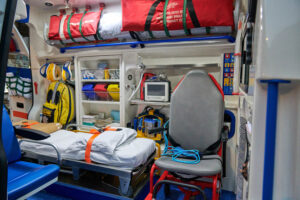
Protecting Workers with Remote Camp Health and Safety
Remote camp health and safety is a vital concern in the management of Canadian remote workforce camps, especially in resource-driven

Exploration remote camp mobilization in Canada is a critical logistical and operational process that supports field-based activities in some of the country’s most isolated and environmentally sensitive regions. From the rugged terrains of the Yukon to the boreal forests of Quebec, mobilizing remote camps enables industries to conduct exploration, research, and development far from established infrastructure.
At its core, the process involves the transportation, setup, and operation of temporary camps designed to support exploration teams in remote areas. These resident camps are often modular, self-contained units that include accommodations, kitchens, sanitation facilities, communications systems, and emergency services. Mobilization typically begins with site selection and planning, followed by the delivery of materials, equipment, and personnel via road, air, or water routes.
The process also includes exploration camp management, which ensures that the work camp operates efficiently and safely throughout the project lifecycle. This involves coordinating logistics, maintaining infrastructure, and overseeing services such as exploration remote food catering services, remote facility cleaning, and remote site housekeeping.
Several Canadian industries depend heavily on exploration remote camp mobilization to access untapped resources and conduct fieldwork:
These industries often require modular camps and modular site offices due to their adaptability and ease of deployment across diverse terrains.
Mobilizing resident camps is a multi-phase operation that includes:
The camps must also comply with remote camp health and safety standards, ensuring that workers are protected from environmental hazards and emergencies.
Mobilizing and operating remote camps in Canada presents a unique set of challenges:
Many exploration sites are located hundreds of kilometers from the nearest town. Transporting equipment and personnel often requires helicopters, ice roads, or barges. This isolation complicates supply chains and increases costs.
Canada’s northern regions experience extreme cold, snowstorms, and seasonal disruptions. Camps must be built to withstand these conditions, requiring durable materials and weatherproof designs.
Remote areas often overlap with protected ecosystems or Indigenous territories. Mobilization must be conducted with minimal ecological disruption, incorporating sustainable practices and exploration facility management that respects local land use.
Projects must adhere to federal and provincial regulations, including environmental assessments, Indigenous consultation, and building codes. This adds layers of complexity to planning and execution.
Extended stays in isolated camps can affect mental health and morale. Providing comfortable accommodations, recreational facilities, and reliable communication is essential.

A skilled camp management company plays a pivotal role in overcoming the unique hurdles of mobilizing and operating remote exploration camps in Canada. To address these obstacles, companies employ several strategic solutions.
Maintaining a functional and hygienic work camp requires a suite of support services:
These services are coordinated through exploration remote site management, which oversees day-to-day operations and ensures compliance with health and safety standards.
Beyond logistics and infrastructure, exploration remote camp mobilization is about people. Workers spend weeks or months away from home, often in challenging conditions. Creating a supportive environment—through quality food, clean facilities, and recreational opportunities—can make the difference between a successful project and high turnover.
Companies also invest in mental health resources, peer support networks, and cultural sensitivity training to foster a respectful and inclusive work camp culture.
Canada’s resource-rich but remote frontiers demand innovation, resilience, and collaboration. From modular living quarters to eco-conscious energy systems, mobile camps play a vital role in unlocking opportunities in isolated terrains. By overcoming geographic, environmental, and operational challenges, industries continue to push boundaries while maintaining safety, sustainability, and respect for Indigenous lands and ecosystems.
Ultimately, the success of any remote field operation rests on the strength of its infrastructure, people, and services—and all of that is made possible through exploration remote camp mobilization.
Need Remote Camp Support You Can Trust? Partner with us for expert mobilization, reliable facilities, and customized modular solutions. Contact the Domco Group today.
Domco Group of Canada Limited is one of the most trusted and well respected remote sites service providers in Canada. Fully Canadian and independently owned, Domco has been in operation since 1945. We offer integrated remote site solutions, including a nutritious and well planned menu cycle, long-term relationship building, and deep Canadian roots in remote locations with Aboriginal communities.
Let us take you through some key advantages that set us apart.

Remote camp health and safety is a vital concern in the management of Canadian remote workforce camps, especially in resource-driven

Keeping crews energized and satisfied starts with smart camp food menu ideas—especially in remote environments where morale and nutrition go

Gas remote camp mobilization is a critical operational phase in Canada’s oil and gas industry, particularly in remote and northern

When it comes to remote site security in Canadian work camps, ensuring safety and protection is paramount. These facilities, often

In Canada’s vast and resource-rich landscapes, remote site maintenance plays a pivotal role in sustaining the operations of work camps

In Canada’s vast and often isolated regions, remote camp management plays a vital role in advancing sustainability across diverse work

Remote site administration is a vital function in Canada’s most geographically isolated and operationally demanding environments. From the Arctic’s frozen

Developing a sustainable infrastructure for a remote camp facility located in the rugged, often isolated regions of Canada—such as the

In Canada’s vast and rugged landscapes, remote facility catering has evolved from a logistical challenge into a platform for sustainable

Budgeting for facility repair and maintenance in remote Canadian work sites is no small task. When miles away from urban

The process of gas remote camp mobilization in Canada is a critical operation that supports the development and maintenance of

Remote facility chefs are the unsung heroes of Canada’s sprawling wilderness operations—from fly-in camps tucked into diamond-rich tundras to energy

Exploration remote camp mobilization in Canada is a critical logistical and operational process that supports field-based activities in some of

Remote off site monitoring is transforming how Canada’s resource sectors manage operations across vast and isolated landscapes, making it a

Remote site services play a critical role in supporting Canada’s natural resource industries—particularly oil, gas, and mining—which have long been
